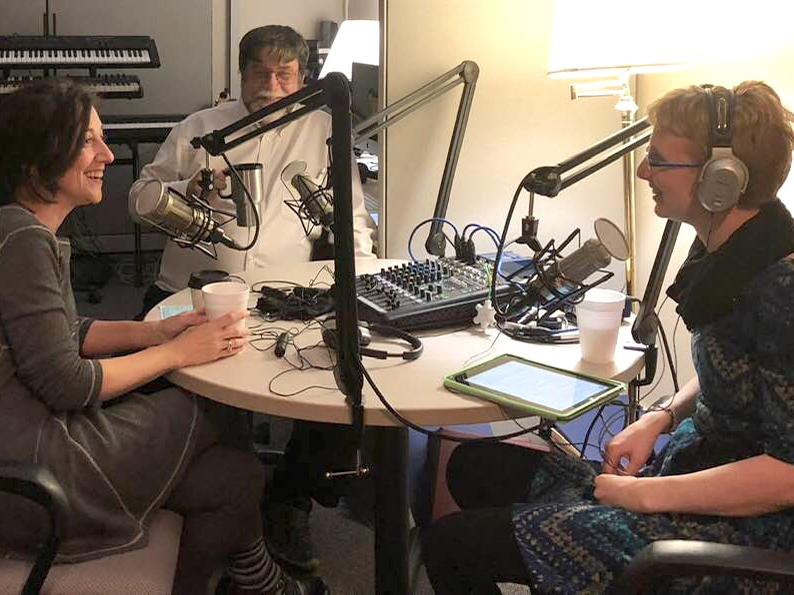CELT support -- John Kane (center) and Rebecca Mushtare (right) lead the college's Center for Excellence in Learning and Teaching providing many avenues of support for enhancing the classroom experience, especially with additional virtual offerings. They also co-host the popular Tea for Teaching podcast, where they are shown having a discussion with Robin DeRosa, director of the Open Learning and Teaching Collaborative at Plymouth State University.
The college's Center for Excellence in Learning and Teaching had already become a well-used resource before, about a year ago, they became an even more important academic lifeline.
As COVID-19 forced changes in college campuses last year, the sudden shift to online learning brought many professors to the CELT office virtually for various services ranging from reading groups on a range of teaching subjects to workshops to attending their combined office hours with the CTS department for needed help.
“With the transition to online learning, the demand became dramatically different because all faculty were teaching in ways that they have never done before. We were seeing people we have never seen before coming in for help,” said John Kane, the director of the CELT office. The week the shift to all-remote classes was announced last March, “we immediately put together a series of a week-and-a-half of workshops to help prepare faculty to transition to online learning.”
Since the start of the pandemic, the CELT office has seen a steady increase in the number of people attending their various workshops, from improving skills in the classroom to learning how to create online activities for students.
“Last year and with the bulk of this occurring after March and onward, we had a total of 3,499 attendees at these workshops; now the majority attends online, but regardless that is more than double what we have had in attendance approximating 1,485 the year before,” said Kane, who is also a professor of economics.
Ongoing demand
Due to the high demand in attendance at the workshops last year, CELT added new workshops this year. Last year the CELT office held 270 workshops in total. Since January they have offered 107 workshops during their two-week Winter Session.
CELT was created by Bill Bosch, a now-retired computer science professor, and started operating in 1994. Now Kane and Rebecca Mushtare run the program creating a welcoming place where teachers can build upon their previously developed skills and bring new ones into their classrooms.
“I like sharing my own experiences related to teaching online because it’s new to me, and I believe it is helpful to just model that to other teachers,” said Mushtare, who also is an associate professor of art. “As a result, we learn a ton and often get inspired and try things learned in our classes. It has also given us a wide range of examples that we can share with faculty on our campus.”
COVID-19 has not just brought new people in attendance to their workshops, but their well-known podcast Tea for Teaching -- which has posted 177 episodes and counting -- has also increased in listeners and downloads.
“We saw a dramatic increase in downloads to most of our episodes in response to COVID; about 80 percent of our downloads are from the U.S., and the rest are mostly from other English-speaking countries, but Brazil is in the top three,” said Kane.
“Transition; trauma infused pedagogy” is the most popular episode to date, achieving 3,190 downloads so far, among the more than 100,000 overall downloads for the podcast. Ongoing success has driven the program into the top 2.5 percent of public podcasts, according to Listen Note, a well-known podcasting website.
New episodes of Tea for Teaching can be found every Wednesday wherever one listens to podcasts, such as Spotify or Apple Music, or on the TeaForTeaching.com website.
Visit the CELT website for more information on available services and upcoming workshops.
-- Written by Jonathan Morrow, Class of 2021




